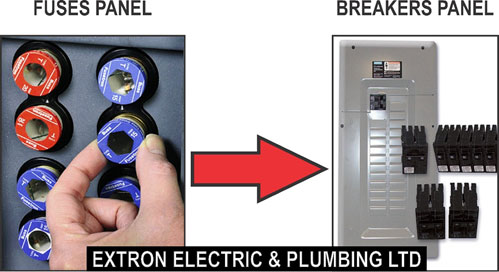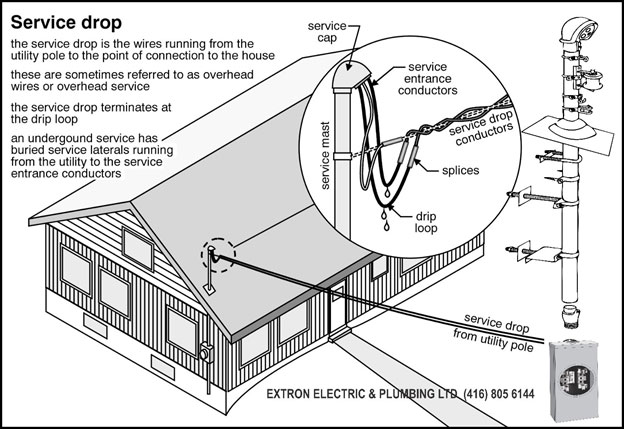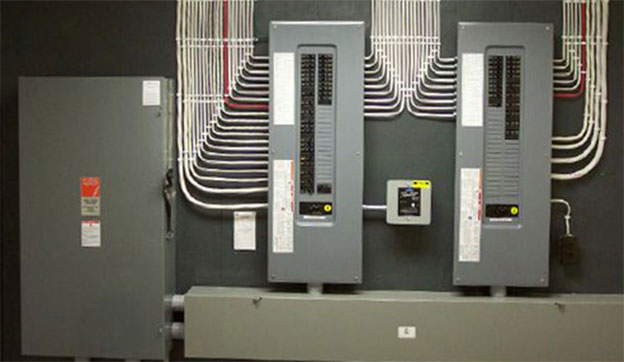Upgrading Main Panel from Fuses to Breakers
Service and panel upgrades in your home could be required for a variety of reasons.
Fuse panels
Older homes and typically smaller homes were built with fuse panels. Fuses by design are as good as breakers, and sometimes better, because they can “trip” faster than breakers. They do have a major flaw. The flaw is that they can be EASILY replaced by a higher amperage fuse. The practice of replacing “burnt” fuses with a higher amperage fuse is extraordinarily dangerous. The danger arises from the amperage rating of the wiring in the wood studded walls. Raising the amperage of the fuse will cause a condition whereby the wires can heat up and become a hazard. Another danger is that fuse panels range from 8 to 16 available spots. This is nowhere near enough circuits for today’s standards and codes.
Circuit Breaker Panels
Upgrades are mandatory from 60amp (very old service) to a standard 100amp service. Upgrading from a 100amp service to a 200amp service can increase the value of your home and may often
be required if the house is being renovated or added to. Typical additions increase power demands such as adding a basement apartment, pool, or hot tub etc.
An important note is that if an electrical panel is replaced and the electrical meter is inside the house, nearby or right at the electrical panel, the meter must be relocated outside where your local
electrical utility dictates it to be. In this case, replacing an old fuse panel or old breaker panel, requires a complete change and upgrade of the complete electrical service.
Fuses to breakers 60 Amp to 100Amp or 200 Amp

Panel Upgrade
- Does your Home still have an old-style fuse panel?
- Are your current circuits overloaded?
- Have circuits been “doubled-up” on breakers?
- Has new wiring been added over the years, and does it meet code?
- Has your Insurance Company refused to renew your home insurance policy?
- Is your panel over 25 years old?
If you answered YES to any of these questions your home may be in need of a service panel upgrade.
Modern Circuit Breaker Panels are more convenient and are built to far higher safety standards than outdated fuse panels.
Extra protection is incorporated into the latest equipment in the form of circuit breakers. The circuit breakers protect every device in the house with sensitive circuitry that responds quickly if there is a fault, opening the circuit and eliminating the risk of danger. There is also excellent protection available in the form of Ground-Fault Circuit Breakers and Arc-Fault Circuit Breakers.
Here are some reasons to Upgrade your Panel:
- Reduce the chance of an electrical fire.
- Eliminate doubled-up circuits
- Eliminate the need to replace fuses, or the chance to install the wrong size fuse, which is a common fire hazard.
- Capacity to add additional circuits in the future.
- Increase the resale value of your home.
Insurance companies usually get uptight when they find out the home has a fuse panel and recommend that the panel be changed to a breaker panel system. Everyone is familiar with
the old screw in fuses. And for those that have a fuse panel know that if the 15 amp fuse keeps blowing you can screw in a 20 amp, 25 amp, 30 amp fuse till
the fuse stops blowing.
This is where the problem lies. The fuses are rated for the wire it is protecting. Our standard lights and receptacles work off a 14 gauge wire. The wire is rated to carry a maximum of 15 amps. So when we plug in too many devices on one circuit the fuse becomes overheated and ‘blows’. By using a larger fuse we may stop the problem of the fuse blowing all the time but the wire is rated to carry only 15 amps.
Now that we’re used a larger fuse the wire becomes overheated, as it is working beyond capacity. These overheated wires are running through wood studs in the walls. The potential for fire now exists.
This is why the insurance companies would like the panel changed over from fuses to breakers. They know that the home will be much safer with a new breaker panel than the old fuse panel. Our electricians have changed over many old fuse panels thatwere in great shape for this very reason. There is nothing wrong with the panel. It’s human error where the problem lies.
Electric Service Drop
Function
The purpose of the service drop and the service entrance is to get electricity safely from the utility into the house.
Overhead Service
The service drop is the collection of overhead wires coming from the utility pole (often at the street) to the point of connection to the house. People call these the overhead wires or overhead service. Electricians and utilities use the words service drop.

Underground Service
Some utilities use the word service laterals to refer to underground services. Here, the wires come from the street underground to the house. They may come up out of the ground outside the house to go to an outside meter or they may go straight into the house.

400 AMPS Service Upgrades

Electrical
Circuit Breaker Troubleshooting
An electrical circuit breaker is designed to trip off when it detects too much power running through the wire it’s protecting. There are three main reasons circuit breakers trip off:

- There is a short circuit
- There is an overloaded circuit.
- The circuit breaker is broken.
Electrical Short Circuits
Short circuits occur when two electrical wires accidentally touch each other. A short circuit will immediately cause one of your circuit breakers to trip off or one of your fuses to blow.
To fix a short circuit, ask yourself this question: “What was happening right before the short circuit?” If you had just plugged something into a receptacle (outlet) or turned on a light or an appliance, then this gives you a clue as to what caused the short.
If you just plugged in an iron, for instance, you can simply un-plug the iron and then re-set the circuit breaker or replace the fuse. If everything is now OK, then your electrical system is fine – and it’s time to get a new iron!
If, however, you can’t find anything plugged in which is causing the problem, then it’s time to call a good electrician to locate and repair your short circuit.
Overloaded Circuit Breaker
Overloaded circuits occur when too much power is running through an electrical wire. To protect the wire, the circuit breaker does its job by detecting the overload and tripping off. The solution to this problem is to remove some of the appliances that are connected to the overloaded wires. You may wish to add a new set of wires so that you can supply power to all your
appliances. For this, you’ll need a good electrician. Electrical Circuit Breaker Troubleshooting Sometimes circuit breakers just wear out and need to be replaced. A knowledgeable homeowner with electrical skills can do the job. Call Extron if you need help with electrical circuit breaker troubleshooting.